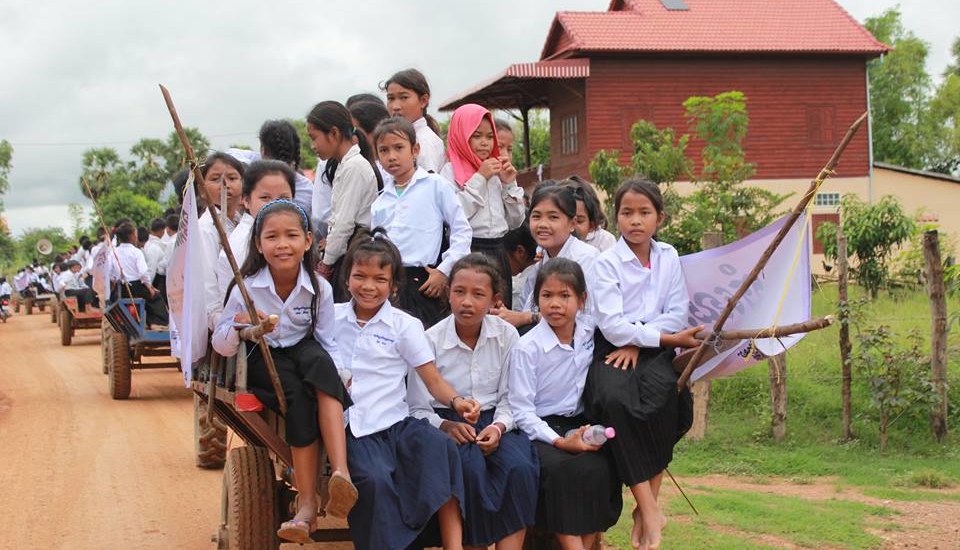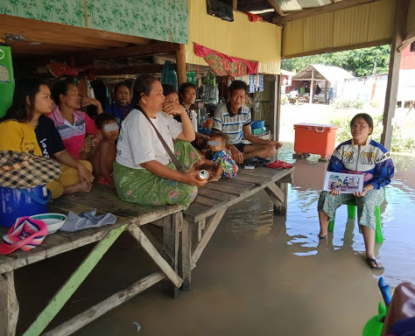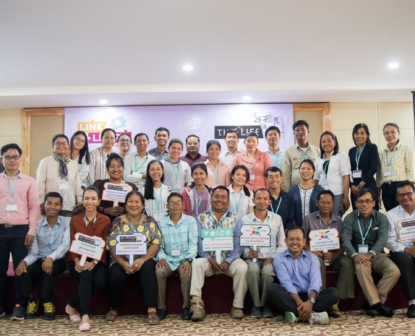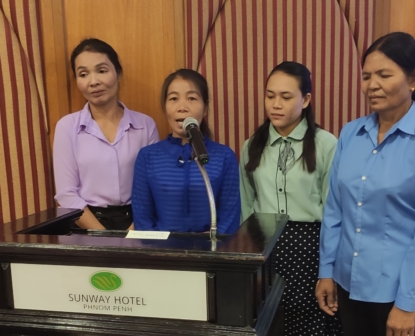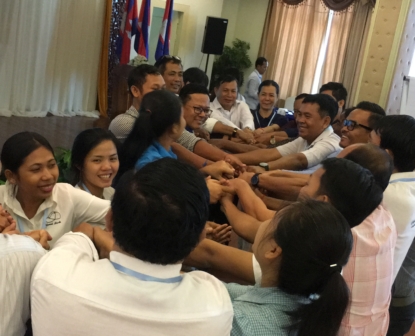Project
WEST: Women’s Empowerment for Social Transformation
-
Amount Funded
181,799 EUROProject Duration
01 Jan 2018 - 31 Dec 2020 -
-
Lead organisation
-
The Cambodian Women’s Crisis Center (CWCC) is a local non-government organisation that was founded in 1997 by a group of women who witnessed the suffering of women and children as a consequence of the war and the various forms of violence carried out against them. CWCC has focused its intervention and services on reducing violence and empowering survivors, particularly related to the areas of domestic violence, rape, sexual abuse and exploitation, trafficking of women and children. Social assistance includes psychological counselling, legal protection, safe shelters, anger management for men, economic empowerment through skills training and small business development, access to education for girls and advocacy to uphold women’s rights towards gender equality. CWCC currently has 104 staff members, excluding Board of Directors. In 2015, CWCC had an annual budget of US$ 1,400,000 with support and encouragement from generous donors, including: Terre des Hommes of Netherlands, Lotus Outreach, Finn Church Aid (FCA), Georg Krause Stifung (GKS), Friendship with Cambodia (FWC), GIZ, Oxfam GB, Korean Ministry of Gender Equality and Family, and DFAT/ANCP through Australian Foundation for the People in Asia and the Pacific (AFAP).
-
Organisation
The Cambodian Women’s Crisis Center (CWCC) is a local non-government organisation that was founded in 1997 by a group of women who witnessed the suffering of women and children as a consequence of the war and the various forms of violence carried out against them. CWCC has focused its intervention and services on reducing violence and empowering survivors, particularly related to the areas of domestic violence, rape, sexual abuse and exploitation, trafficking of women and children. Social assistance includes psychological counselling, legal protection, safe shelters, anger management for men, economic empowerment through skills training and small business development, access to education for girls and advocacy to uphold women’s rights towards gender equality. CWCC currently has 104 staff members, excluding Board of Directors. In 2015, CWCC had an annual budget of US$ 1,400,000 with support and encouragement from generous donors, including: Terre des Hommes of Netherlands, Lotus Outreach, Finn Church Aid (FCA), Georg Krause Stifung (GKS), Friendship with Cambodia (FWC), GIZ, Oxfam GB, Korean Ministry of Gender Equality and Family, and DFAT/ANCP through Australian Foundation for the People in Asia and the Pacific (AFAP).
-
Project
The project of the Cambodian Women’s Crisis Center (CWCC) is named Women’s Empowerment for Social Transformation (WEST). In this project, CWCC works closely with three target groups: vulnerable women and women and girl survivors of GBV (sexual abuse, trafficking/exploitation and domestic violence), elderly women whose children migrate to work in Thailand thus they are left at home to look after their grandchildren, and finally, disabled women and girls. Women and girls living in CWCC’s target areas in Banteay Mean Chey, are often vulnerable to human rights abuses, particularly sexual assault/rape, labour exploitation/trafficking and domestic violence because the areas are very remote and isolated. The issues of abuse, violence and neglect effect the lives of women and girls. The WEST project is designed to address the above problems with the mentioned women and girls becoming agents for change by engaging in the activities to influence duty bearers/policymakers to address their problems and needs. The WEST project is implemented in 3 districts of Banteay Mean Chey province (2 communes in each district): Mongkul Borei, O’chrov and Malay. The project focusses on building capacity and confidence of the target groups to form themselves as Women Support Groups, Provincial Women Network and Social Ambassadors to report violence and discrimination cases, as well as expressing their needs to influence duty bearers for services. Furthermore, they will also become community advocators to raise awareness on women’s human right and gender equality. At the same time, the project builds capacity of duty bearers on women human right and gender equality (complimentary by other CWCC’s donors) so that they provide space for women to speak out/express their problems and needs. It is expected that through the project implementation four key results will be achieved: Result 1: Twelve women Support Groups (WSGs) in the 3 targeted Districts established and actively raise issues impacting their lives at household and community levels. Result 2: Six Social Ambassadors selected and supported to perform the role as Campaigners to promote women’s rights and gender equality Result 3: One Provincial Women Network (PWN) established that mobilises vulnerable/ disadvantaged women to actively be involved in advocacy activities to influence service providers and decision/policy makers to respond to the issues related to gender-based violence (GBV)/exploitation and discrimination Result 4: Case studies and lessons learned from the activities are documented. The results are taken by WSG, SA and PWN and shared with stakeholders (government and CSOs) to influence decision makers, law enforcement officers to uphold women’s rights and gender equality.
-
-
The project of the Cambodian Women’s Crisis Center (CWCC) is named Women’s Empowerment for Social Transformation (WEST). In this project, CWCC works closely with three target groups: vulnerable women and women and girl survivors of GBV (sexual abuse, trafficking/exploitation and domestic violence), elderly women whose children migrate to work in Thailand thus they are left at home to look after their grandchildren, and finally, disabled women and girls. Women and girls living in CWCC’s target areas in Banteay Mean Chey, are often vulnerable to human rights abuses, particularly sexual assault/rape, labour exploitation/trafficking and domestic violence because the areas are very remote and isolated. The issues of abuse, violence and neglect effect the lives of women and girls. The WEST project is designed to address the above problems with the mentioned women and girls becoming agents for change by engaging in the activities to influence duty bearers/policymakers to address their problems and needs. The WEST project is implemented in 3 districts of Banteay Mean Chey province (2 communes in each district): Mongkul Borei, O’chrov and Malay. The project focusses on building capacity and confidence of the target groups to form themselves as Women Support Groups, Provincial Women Network and Social Ambassadors to report violence and discrimination cases, as well as expressing their needs to influence duty bearers for services. Furthermore, they will also become community advocators to raise awareness on women’s human right and gender equality. At the same time, the project builds capacity of duty bearers on women human right and gender equality (complimentary by other CWCC’s donors) so that they provide space for women to speak out/express their problems and needs. It is expected that through the project implementation four key results will be achieved: Result 1: Twelve women Support Groups (WSGs) in the 3 targeted Districts established and actively raise issues impacting their lives at household and community levels. Result 2: Six Social Ambassadors selected and supported to perform the role as Campaigners to promote women’s rights and gender equality Result 3: One Provincial Women Network (PWN) established that mobilises vulnerable/ disadvantaged women to actively be involved in advocacy activities to influence service providers and decision/policy makers to respond to the issues related to gender-based violence (GBV)/exploitation and discrimination Result 4: Case studies and lessons learned from the activities are documented. The results are taken by WSG, SA and PWN and shared with stakeholders (government and CSOs) to influence decision makers, law enforcement officers to uphold women’s rights and gender equality.
-
Working beyond the individual
Poverty as well as lack of knowledge or awareness about their human rights compromises the quality of women’s lives, often leading to Gender-based Violence (GBV). During the COVID-19 outbreak, these factors gained even more impact on negatively impacting women’s lives.
The Women’s Empowerment for Social Transformation (WEST) project successfully formed Women’s Self-help Groups (WSGs) in its 12 villages across 6 communes of 3 targeted districts, with a total of 180 WSG members. To strengthen their capacity on gender equality, domestic violence as well as women’s political participation and advocacy, the project recruited and trained 6 Social Ambassadors (SAs). The SAs played an important role in representing and supporting the WSGs in strengthening their members and raising the voices of vulnerable women with disability, the elderly, women migrant returnees, and women survivors of GBV.
Key activities of the WSGs included:
- 80 awareness-raising sessions were conducted by the WSGs on women’s rights, gender and domestic violence, and regular monthly and quarterly meetings were conducted with the Provincial Women Network (PWN) and District Women Networks (DWNs).
- 6 pre-International Women’s Day campaigns and a public forum engaged project participants and local authorities to discuss proper solutions together. PWN representatives were able to organise and facilitate the district public forums smoothly.
- 7 sessions of a radio call-in show “Women’s Voice for Change” were organised under the slogan “No Women Left Behind”, with 2 speakers each session from relevant ministries and CSOs. The project participants recognised the show as an effective channel to reach their target groups. In addition, 4 representatives of the WSGs (elderly women, women with disabilities, and women migrant returnees, and woman GBV survivors) joined the shows as guest speakers. They shared their life experiences, expressed their needs and made recommendations on improving women’s lives.
- 3 district public forums were conducted by PWN focused on the “effectiveness of social service providing for vulnerable women”. The issues on women’s life experiences and needs, as well as how to respond to these needs effectively were discussed openly and under participation of duty bearers.
- 11 case studies and 6 newsletters on stories of change of WSGs were collected and developed by the SA groups on vulnerable women, which were used as an evidence base for advocacy work.
The project resulted in the women claiming their rights and influencing changes to behaviour and policy implementation. 28 out of 180 WSG members able to receive a Poor-ID card, which entitles them to funding from the government.
Publications:
- “Making our voice loader!”: https://voice.global/blog/making-our-voices-louder/
- “Three women. Three paths. One organisation”: https://voice.global/stories/three-women-three-paths-one-organisation/
- “Supporting others, even through a crisis!”: https://voice.global/stories/supporting-others-even-through-a-crisis/
- “Work harder, Voice loader!”: https://voice.global/blog/work-harder-voice-louder/
Video publication:
- Raise your VOICE!
https://www.facebook.com/CambodianWomensCrisisCentercwcc/videos/2935279973384865
A social media page for SA was created to share their activities and project events: https://www.facebook.com/%E1%9E%91%E1%9E%BC%E1%9E%8F%E1%9E%9F%E1%9E%BB%E1%9E%86%E1%9E%93%E1%9F%92%E1%9E%91%E1%9F%88%E1%9E%9F%E1%9E%84%E1%9F%92%E1%9E%82%E1%9E%98-2161181453941813
-
News

